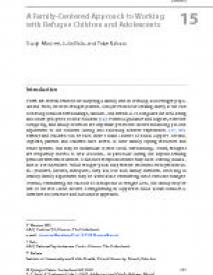A Family-Centered Approach to Working with Refugee Children and Adolescents
Families provide children with crucial surroundings of social support, acknowledgment, and hope, creating a protective shield. When a family is confronted with adversities and long-lasting stress and faces adjustment difficulties, familial support may become inadequate, and the family environment is a source of additional stress for the child. It is therefore important to find ways to preserve and strengthen family support in times of difficulties.
How do families adapt to disruptive circumstances and changed environments? What is known about families adapting to crises and turmoil? In which way can families be supported when confronted with stress and adversity? We will begin with a theoretical and conceptual overview of how to understand the experience of refugee families.
Then we will discuss practical family-centered programs, such as multifamily groups that can foster adjustment during and after severe upheaval. Such groups have been applied in low-income as well as high-income countries with different types of populations.
Geachte bezoeker,
De informatie die u nu opvraagt, kan door psychotraumanet niet aan u worden getoond. Dit kan verschillende redenen hebben,
waarvan (bescherming van het) auteursrecht de meeste voorkomende is. Wanneer het mogelijk is om u door te verwijzen naar de bron
van deze informatie, dan ziet u hier onder een link naar die plek.
Als er geen link staat, kunt u contact opnemen met de bibliotheek,
die u verder op weg kan helpen.
Met vriendelijke groet,
Het psychotraumanet-team.
In: Song S., Ventevogel P. (eds) ; Child, Adolescent and Family Refugee Mental Health | june | 243-255 | Cham : Springer
https://doi.org/10.1007/978-3-030-45278-0_15


